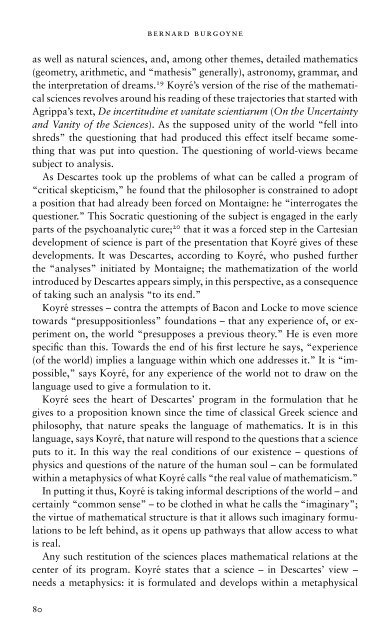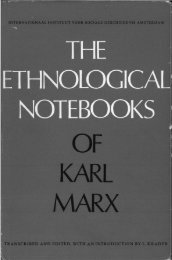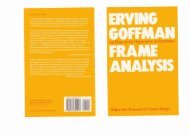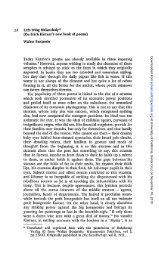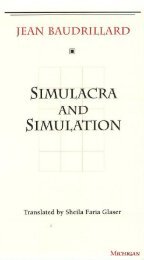X8JKsF
X8JKsF
X8JKsF
Create successful ePaper yourself
Turn your PDF publications into a flip-book with our unique Google optimized e-Paper software.
ernard burgoyne<br />
as well as natural sciences, and, among other themes, detailed mathematics<br />
(geometry, arithmetic, and “mathesis” generally), astronomy, grammar, and<br />
the interpretation of dreams. 19 Koyré’s version of the rise of the mathematical<br />
sciences revolves around his reading of these trajectories that started with<br />
Agrippa’s text, De incertitudine et vanitate scientiarum (On the Uncertainty<br />
and Vanity of the Sciences). As the supposed unity of the world “fell into<br />
shreds” the questioning that had produced this effect itself became something<br />
that was put into question. The questioning of world-views became<br />
subject to analysis.<br />
As Descartes took up the problems of what can be called a program of<br />
“critical skepticism,” he found that the philosopher is constrained to adopt<br />
a position that had already been forced on Montaigne: he “interrogates the<br />
questioner.” This Socratic questioning of the subject is engaged in the early<br />
parts of the psychoanalytic cure; 20 that it was a forced step in the Cartesian<br />
development of science is part of the presentation that Koyré gives of these<br />
developments. It was Descartes, according to Koyré, who pushed further<br />
the “analyses” initiated by Montaigne; the mathematization of the world<br />
introduced by Descartes appears simply, in this perspective, as a consequence<br />
of taking such an analysis “to its end.”<br />
Koyré stresses – contra the attempts of Bacon and Locke to move science<br />
towards “presuppositionless” foundations – that any experience of, or experiment<br />
on, the world “presupposes a previous theory.” He is even more<br />
specific than this. Towards the end of his first lecture he says, “experience<br />
(of the world) implies a language within which one addresses it.” It is “impossible,”<br />
says Koyré, for any experience of the world not to draw on the<br />
language used to give a formulation to it.<br />
Koyré sees the heart of Descartes’ program in the formulation that he<br />
gives to a proposition known since the time of classical Greek science and<br />
philosophy, that nature speaks the language of mathematics. It is in this<br />
language, says Koyré, that nature will respond to the questions that a science<br />
puts to it. In this way the real conditions of our existence – questions of<br />
physics and questions of the nature of the human soul – can be formulated<br />
within a metaphysics of what Koyré calls “the real value of mathematicism.”<br />
In putting it thus, Koyré is taking informal descriptions of the world – and<br />
certainly “common sense” – to be clothed in what he calls the “imaginary”;<br />
the virtue of mathematical structure is that it allows such imaginary formulations<br />
to be left behind, as it opens up pathways that allow access to what<br />
is real.<br />
Any such restitution of the sciences places mathematical relations at the<br />
center of its program. Koyré states that a science – in Descartes’ view –<br />
needs a metaphysics: it is formulated and develops within a metaphysical<br />
80


